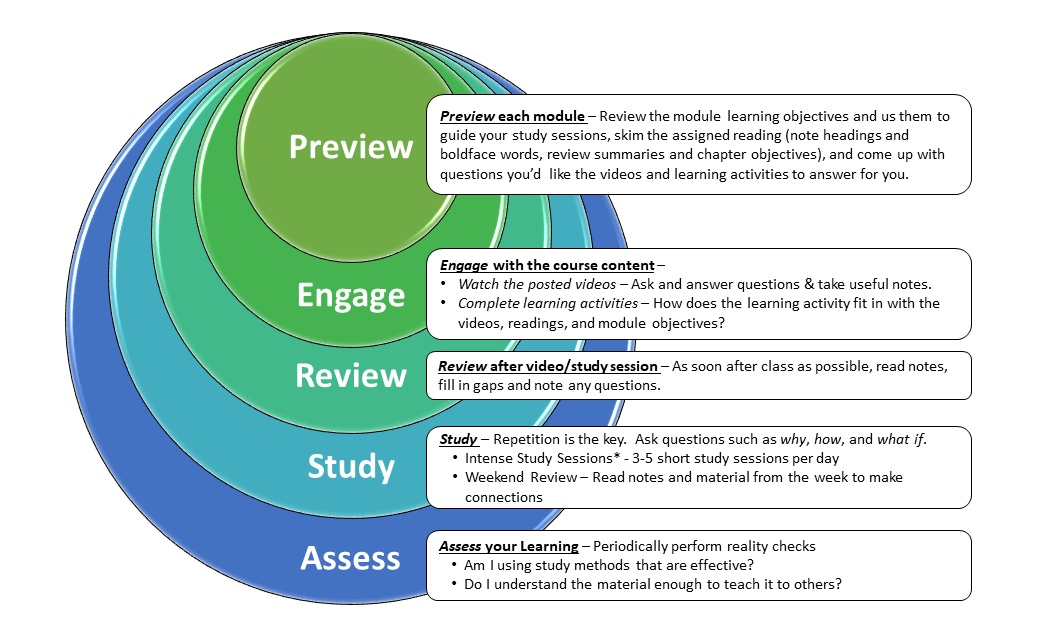TE 200: Course Overview
Welcome to the wonderful world of polymers!
We will explore the science and engineering of large molecules. The content will focus on polymer structure, synthesis, kinetics, and properties. We will correlate the molecular structure of polymers to their properties and understand why polymers are so different from small molecules. Freshman chemistry (CH 101) is a prerequisite for this course and we will be learning some basic organic chemistry (polymer synthesis). I assume you are comfortable with molecular forces and can interpret basic skeletal structures. If you need help with basic chemistry concepts, there is a review section in Moodle. Please reach out sooner rather than later if you are struggling with the chemistry concepts. We will help you!
How Do I Succeed in TE 200?
Have you ever thought about how you study and how you learn? Are your old study methods from high school not working the way they used to? What’s the difference, if any, between studying polymer science & engineering and learning polymer science & engineering? For which task would you work harder:
- To make an A on the test or
- To teach the material to your peers?
To stay in the learning mode, not the study mode, you need to study as though you have to teach the material, not just make an A on the test. And if you want to learn how to do that, I urge you to look at Prof. Saundra McGuire’s book,[1] Teach yourself how to learn: strategies you can use to ace any course at any level. This book is available online for free through the NCSU libraries. I have seen Prof. McGuire present three times; her results are impressive! I know I, personally, have much to learn from her.
We all want to study smarter, more effectively, and more efficiently, not harder and for longer times. To do that, consider using McGuire’s study cycle and trying her suggested “intense study sessions,” which are explained in Table 1. I have adapted her study cycle graphic for our online course (Figure 1).
Table 1. Prof. McGuire’s “Intense” Study Session Format1
| 1 | Set a Goal | 1 – 2 minutes | Decide what you want to accomplish in your study session. |
| 2 | Study with Focus | 30 – 50 minutes | Interact with material: organize, concept map, summarize, process, re-read, fill-in notes, reflect, etc. |
| 3 | Reward Yourself | 10 – 15 minutes | Take a break: chat with a friend, play a short game, get a snack. |
| 4 | Review | 5 minutes | Go over what you just studied. |

In TE 200 and most STEM courses, content builds upon earlier concepts. What we learn at the beginning of the semester will be important at the end of the semester. In addition, we will use concepts that you should have learned in freshman chemistry (or HS chemistry). In particular, intermolecular bonding and interpreting chemical structures will be important. Organic chemistry is not a prerequisite for this class! You will learn all of the organic chemistry you need during the semester. With that said, TE 200 students have diverse skills in chemistry and a number of you lack confidence in your chemistry skills. Remember we are here to help you! There is a section in Moodle to review molecular bonding and skeletal structures, as these concepts are important for success in TE 200. If you are struggling with basic chemistry concepts, you are not the first and will not be the last. We will help you, but you must reach out for help…and sooner is better than later.
An important part of learning in an online, asynchronous course is staying track by spending time on the course multiple times throughout the week. This is especially true in a course that builds on concepts throughout the semester. While we accept late assignments without penalty, the due dates are there for a reason—to keep you on track for the high stakes assessments (exams) and to complete the course before the semester ends. Cramming right before an exam or other deadline may work in the short term, but it is not a good way to really learn the material and such methods may lead to trouble with more advanced topics. Someone who regularly puts time into TE 200 will typically spend less time overall than someone who crams at the last minute (because they won’t have to relearn the material!). Research-based best practices include:
- Spend time on TE 200 nearly every day.
- Start assignments early.
- Always attempt to solve problems and answer questions without looking at an example or the solution.
- Struggling through really helps you learn the content, but make sure you don’t struggle too long and waste time.
- Always ask why, how, and what if questions.
- Test understanding by giving “mini lectures” on concepts.
- Use the “Study Cycle” with “Intense Study Sessions.”
- Do preview-review for every section/module.
Asking for help is an important skill that top students have mastered. Please reach out if you are having trouble with the content or are falling behind. I am here to help you understand the concepts and learn to apply them. If you are having trouble or just need to talk through your ideas, email me. We can meet in person or on Zoom, communicate through email, or approach working together however best fits your needs. I am here to help you be successful in this course.
- McGuire, S. Y., & McGuire, S. (2018), Teach Yourself How to Learn : Strategies You Can Use to Ace Any Course at Any Level First edition. Stylus Publishing. ↵

